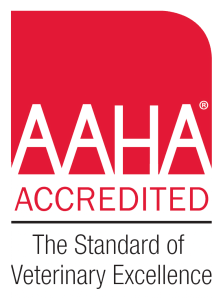People used to think that dog training was only about teaching dogs some obedience commands. Commands that were usually taught with heavy-handed punishment-based techniques. Dog training was viewed as somewhat of a luxury for pet parents and was often wrongly considered to be something so straightforward and simple to achieve that anyone could do it without the help of a professional.
This sentiment does still exist to a degree. Still, many dog owners are increasingly beginning to recognize that the aid of a professional dog trainer can sometimes have immense value and, in some instances, can be lifesaving. Finding the perfect dog trainer in can help point them and their canine friends in the right direction and provide that much-needed guidance for success.
Today dog owners face an increasingly difficult choice when it comes to choosing the right dog trainer.
Dog Trainers at Brook-Falls Offer Only Positive Training
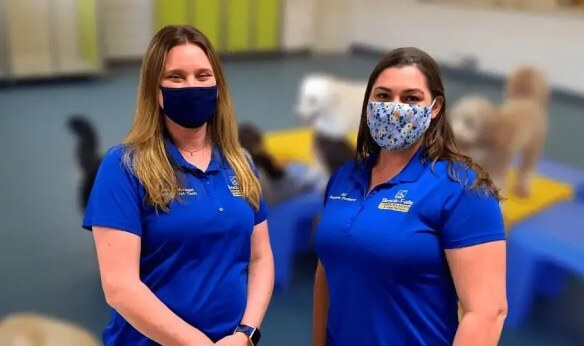
The science behind training (not just dog training) has dramatically evolved over the past 30 years. Because of this change, the profession of dog training has exploded, but not without controversy.
Many traditional trainers continue to promote outdated dominance/punishment-based philosophies. Thankfully, there is an ever-growing army of enlightened, positive trainers like those here at Brook-Falls Luxury Pet Resort and Doggy Day Care.
However, what is no longer up for debate is that provided you hire a qualified, truly positive trainer, any money spent on training will be returned to both you and your dog exponentially in terms of a healthy relationship and a harmonious household.
Good Canine Education
The fact is that many pet dogs have had no formal training – positive or otherwise. Since dogs are now sharing our homes and our lives in ever closer ways, it is more important than ever that every dog be given a “good canine education.” Doing so will prevent countless dogs from being surrendered to shelters due to behavioral issues that could have been easily prevented.

Investing the time to teach your dog will make living with them easier and that investment could also save its life.
Here are 5 Reasons Why You Should Train Your Dog
- Build a Positive Relationship
One of the best ways to build a healthier relationship with your dog is to understand how your dog learns and use positive reinforcement training principles to make learning as rewarding, successful, and easy as possible. Punitive trainers believe that to achieve so-called “balance” with your dog, you must first teach it who is boss by becoming the “alpha or pack leader.” This approach is doomed to fail from the start because the methods used to establish this dominant status are both physically and psychologically damaging to your dog, not to mention they can be dangerous for you.
Positive training, which rewards and motivates a dog for good behavior, allows you to foster a relationship with your dog based on mutual trust and respect instead of fear and intimidation. The most effective trainers can influence their student dogs’ behavior without using force and work through any problems calmly and humanely. Dogs that are taught using positive reinforcement methods are more tolerant, self-controlled, and behave in much more predictable ways in different situations.
2. Teach Life Skills
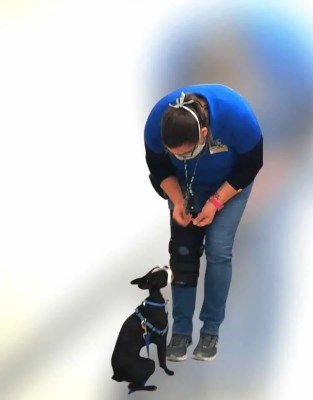
Every dog needs to learn how to live successfully in a home environment. Our domesticated pet dogs might seem to have an easier life than their wild counterparts but living in a human world comes with its own set of specific and unique pressures for dogs. Teaching your dog basic manner skills and then providing them with adequate mental enrichment and physical exercise will go a long way in preventing them from developing anxiety and other stress-related behaviors. These behaviors may include destructive chewing, inappropriate barking, elimination, and dangerously aggressive behaviors.
A significant part of the learning process is to set your dog up for success. This is achieved by managing their environment and making it easy for them to succeed and do well. Begin by understanding how your dog copes in certain situations. For example, if your dog is highly social and loves new people coming into your home, teach them how to greet without jumping or overwhelming your guest as they enter. This training will help curb excitable behaviors while 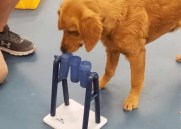 still allowing them to enjoy a new person’s arrival. If your dog should instead be wary or fearful of new people, you can take the pressure off them by putting them behind a baby gate or in their room or kennel as guests enter. This will help keep your dog’s stress level low and keep them more emotionally stable and less likely to act inappropriately. In general, “space” is vitally important for dogs. For those socially inexperienced or fearful dogs, managing the environment in which they reside will greatly reduce stress for all parties and aid in keeping everyone happy and safe.
still allowing them to enjoy a new person’s arrival. If your dog should instead be wary or fearful of new people, you can take the pressure off them by putting them behind a baby gate or in their room or kennel as guests enter. This will help keep your dog’s stress level low and keep them more emotionally stable and less likely to act inappropriately. In general, “space” is vitally important for dogs. For those socially inexperienced or fearful dogs, managing the environment in which they reside will greatly reduce stress for all parties and aid in keeping everyone happy and safe.
3. Increase Sociability
Increasing your dog’s enjoyment of social interaction will give them the confidence to deal with domestic life pressures. Training your dog to have good manners and behave well in different situations requires effort. One needs to have a consistent commitment and effective positive training techniques to ensure success.
In general, we have high expectations for our dogs’ behavior. For example, we desire for our canine companions to be friendly with everyone they meet, even if they may be uncomfortable in these situations. To meet these expectations, it is vital to socialize your dog by giving them good experiences in the presence of all kinds of people, animals, and environments. Doing so at a young age is the most ideal as it will give them confidence and lessen the chance of them experiencing anxiety and discomfort as they move into adulthood.
Socialization does not have to mean your dog needs to touch another dog or a person frequently physically. Humans “socialize” all the time without physically touching each other. Exposing your dog to different situations where they can observe and “converse” at a distance is as important as teaching them to accept physical touch. Humans are naturally drawn to interact with a cute pup, and when dogs greet each other, some physical touching is likely to occur.
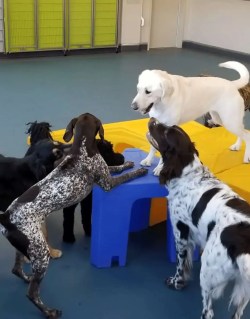
Teaching socialization is all about keeping your dog comfortable in these social situations while taking care not to force them into a situation they might find uncomfortable. If you have the kind of dog that does not interact well with others, do not despair and do not force them. Like people, not all dogs are social. Understanding how your dog copes will determine how far you can proceed in these situations. Even though having a social dog is preferable in our society, it is not a failure to keep your dog out of situations they find uncomfortable. Observing how they cope will help you respect and understand their limitations. A good trainer can help point you toward additional steps you can take in managing these situations.
4. Avoid Problem Behaviors
Training your dog builds up a language of communication between you that promotes security and comfort. The more time you invest in teaching your dog to live successfully in a human world, the more likely you will avoid problem behaviors that arise from a lack of understanding between the two of you. Many dogs, unfortunately, end up displaying negative behaviors that could have been easily avoided if time were taken to help them learn. Most dogs can readily be taught to respond well to common training cues such as SIT, COME, and STAY, but many of these dogs remain unprepared to deal with life pressures in the real world. Here is where a good trainer can help you develop the needed understanding that every cue or action being taught has a purpose behind it. For example, the cue for SIT is an invaluable skill for a dog to master because it can be utilized to help you to control your dog’s behavior in a variety of situations; before the front door is opened or crossing a road to name a few.
Mastering the COME cue can allow your dog to enjoy off-leash play, but it also ensures your dog will return to you when you desire. Learning Hand Targeting is another vital skill. It not only helps your dog get used to hands being extended towards them, a scenario they will experience many times throughout their life but is also good for teaching a Recall.
5. Loyalty and Companionship
Positive reinforcement does not mean you do not mark your dog’s misbehaviors; rather the discipline should be used as constructive guidance, not an intimidation technique. There seems to be a great misconception that positive trainers never say “no” to their dogs, and they allow them to get away with inappropriate and negative behavior. There is also a misguided belief that positive trainers only teach by “stuffing food into dogs’ faces” and lack the skills to truly rehabilitate severe problem behaviors such as aggression.
This is far from the truth. Positive training helps people foster relationships with even problem dogs by understanding and turning around the problem behavior without the use of force or fear. Discipline in the form of time-outs, removal or denial, vocal interrupters, or merely ignoring behavior that you do not like is far more effective than employing harsh negative and dominant-based behaviors. Positive training techniques change behaviors without damaging the trust between dog and owner. Anyone can use rewards to teach dogs to learn, but it takes advanced knowledge and skill to turn around negative behavior without the use of force. Guiding your dog to make the right choices and understanding what they need to be happy will increase the bonds between you.

When dog owners make and take the time necessary to teach their dogs, they invariably have more fulfilling lives with their canine companions than those who just expect their dog to know how to behave. A healthy balance of learning manners, encouraging sociability, and providing your dog with the right kind of outlets will ensure success. People who fail to give their dogs the education they need are doing their dogs a great disservice and will have to contend with future problems.
The learning process does not have to be costly or intense; the more enjoyable it is for the both of you, the better the results will be.
The team of Brook-Falls Luxury Pet Resort and Doggy Day Care is here to assist you in getting your dog off on the right track. We offer a series of three training classes, which are described below:
Puppy Head Start Program at Brook-Falls
Puppy Head Start is geared towards puppies 2-4 months of age. This class teaches the basics of positive training techniques through food reward and praise. Simultaneously this class helps to build the puppy’s confidence in everyday life situations through hands-on games. For example, “Gotcha” teaches the puppy to be restrained calmly, and “Hand in Bowl” teaches the puppy to be OK with people taking his or her food.
Each session is followed by socialization, which is essential for puppies to learn at a young age to ensure that they will accept social situations as an adult. Our Puppy Head Start class is designed as a “come as you wish” format. You and your puppy can visit every week or every other week without the hard commitment required in our other courses. This benefits the human-animal bond and allows you to keep this learning fun and casual as you and your puppy get to know one another. This class is specifically designed to be driven more by owner questions, mixed with learning games and socialization, rather than behavioral cues. We save those behavior cues for our Basic Manners class so we can provide the great groundwork for you and your puppy to have a great relationship!
Basic Manners Dog Training Classes
Basic Manners is geared towards dogs older than 4 months of age. Basic, everyday dog manners are taught in this course using positive training techniques proven to work and strengthen the human-animal bond. By the end of our 8-week course, your dog will be looking to you for guidance to earn your praise. The manners learned in the class consist of sit, down, off, focus, come, drop-it, leave-it, stay, and loose-leash walking. These manners help teach your dog to be a more tolerant and self-controlled member of your family. In turn, your dog will behave in a more predictable way, which reduces stress for both you and your pet!
Additionally, dogs that understand boundaries and have self-control are more likely to remain in their home with a loving family. Often, if dogs are slightly hesitant towards social interaction, placing them in a class like this can teach them not to be afraid of other dogs or humans. Your pet will not need to interact directly with other dogs, but they can instead observe from a distance while receiving treats and praise from their owners.
The 8-week course design allows ample time to practice each cue and receive one-on-one attention from the instructor. so your dog will not only receive an obedience education, but you will receive valuable canine health information as well. Our instructors are well versed in the veterinary medical field and will be happy to answer any medical questions you may have. This is our most popular class – sign up early!!
Advanced Manners Dog Training
Advanced Manners is geared towards dogs who have graduated from our Basic Manners program and are at least 6 months of age. Advanced Manners is a continuation of the Basic Manners class working on improving the manners taught there and new cues. The new cues worked on consist of target/touch, wait, and heel. Many owners choose to launch directly into the Advanced Manners Class immediately after completing the Basic Manners Class to keep up their learning momentum.
In our Advanced Class, dogs will be challenged to respond to cues much faster and from a distance and must hold the behavior for a longer period. If you aspire to move on to dog sport in the future, the education obtained in our Advanced Manners Class will be invaluable.
Brook-Falls Dog Training Classes
Please visit our website to learn more about our three core training classes and any specialty classes we may be offering. You can also get to know our trainers on the website and view a complete calendar of training dates and times to assist with the sign-up process. We look forward to serving you and your dog!
About Brook-Falls
Brook-Falls Veterinary Hospital and Exotic Care is dedicated to providing quality care to all companion pets and exotic animals. Brook-Falls is a Menomonee Falls, WI-based full-service veterinary hospital with an extensive range of comprehensive medical, dental, diagnostic, and surgical services to meet the varying needs of all patients. Brook-Falls Veterinary also offers informational and educational media and seminars for pet owners by way of blogs, digital TV series (Expert Veterinary Television), e-books, whitepapers, infographics, and more.
For more information, contact Brook-Falls Veterinary Hospital & Exotic Care, Inc.
